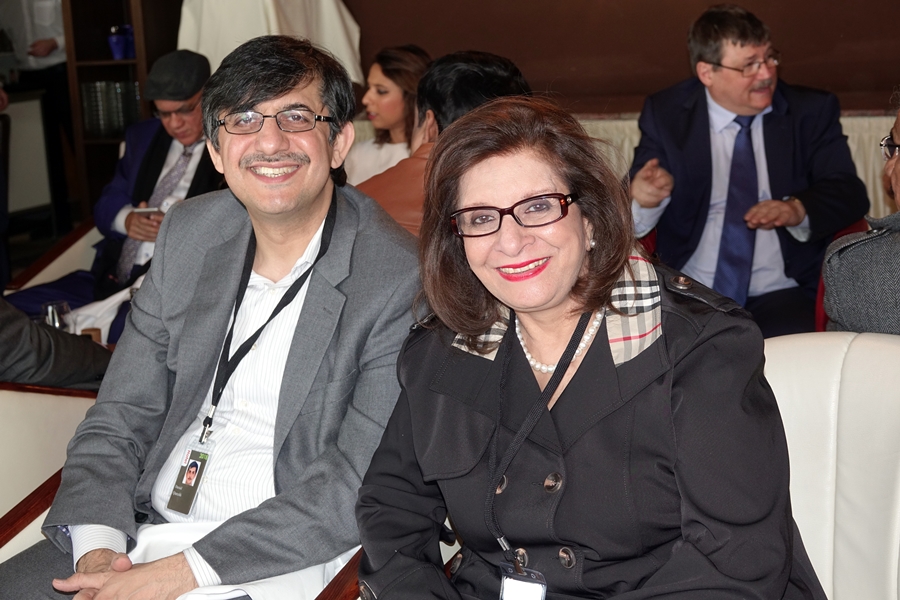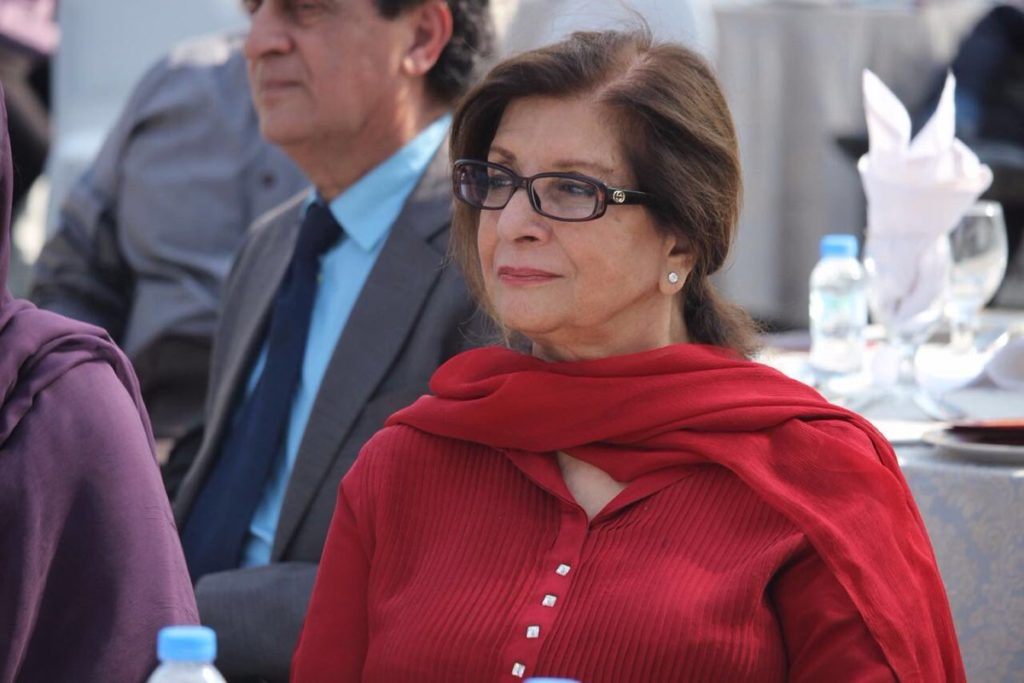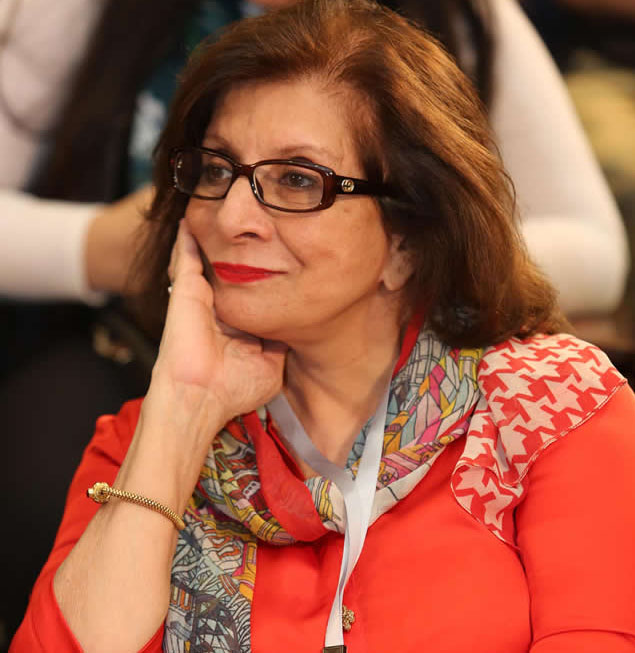Q) Ma’am kindly tell us something about your professional background and how it all started?
I joined Pakistan Television Corporation (PTV) in 1975 hosting regional shows for children such as Roshan Tara and later on Sang Sang Chalen, writing scripts for them also. Later when an opening came up in PTV for producers, I applied and was selected. I underwent a 14-month training which I did successfully. Later I did many music shows such as Umang, Tarang, etc. including many Nazia Hassan, Tina Sani and Abida Parveen programmes.
My first serial as director was “Marvi” which became extremely popular with the viewers and received the 10 Years Best Serial Award. In 1996 I opened my own production house, the first largest production house in Pakistan under the banner of Momal Production, Momal being the name of my daughter in law. I shot my first private play, “Doosri Duniya” in San Francisco, this was shown by PTV and became hugely successful.
In 2000 I took early retirement and properly established my production house and as there were no private television channels at that time, I sold my plays to PTV. When my younger son returned after completing his MBA, he asked me to start a private television channel. At that time only two private channels were operating, ARY and GEO TV. I was not too keen but he kept persuading me and finally in 2004/2005 we started the HUM Network Channel. At that time there were only hybrid channels, a mix catering to almost everything i.e., News, Current Affairs, Sports, Entertainment, etc. Since I travelled a lot and saw what was being offered abroad, I thought of opening up separate TV channels that catered to separate topics i.e., music channel, news, entertainment, etc. When I thought of setting up a separate entertainment channel, I was discouraged by a lot of people who believed I would not be successful, but I remained steadfast. Knowing the immense potential available in Pakistan I succeeded in my endeavour, making Pakistani plays. At that time only Indian dramas and soaps were being broadcast. HUM was the only media company in Pakistan to be listed on the Karachi Stock Exchange. Lately cinema houses have opened up in Saudia Arabia where for the first time our Pakistani film “Parwaz Hai Junoon” was screened; also NBC Arabic channel showed our serial “Hamsafar” which was dubbed in Arabic language, I really enjoyed listening to Mahira speaking Arabic!
Q) You have to your credit a number of very bold dramas that focussed on sensitive issues of our women, have you faced any negativity from the audience, any social pressure or even political?
I must mention here that my network only broadcasts Pakistani plays. Till today not a single Indian programme has been shown by us. The HUM logo has the distinction of introducing a number of actors and actresses, such as, Mahira, Sanam Baloch, Fahad Mustafa and many others. There are serious issues in our society and it is up to me to feel the society’s pulse and raise such issues on TV. By raising taboos that have never been done before I am able to portray them without fear or crossing red lines. My play ‘Kankar’ was on the topic of domestic violence, something very common in our country. My aim is not to make women rebellious but to make them aware of women empowerment where they can stand up for their rights. Slowly the audience began to understand and became more conscious of many issues that are harming our society. When I did “Udaari” which was on child abuse, it received a positive response and a lot of encouragement from the people, but the regulatory authority, PEMRA sent me a Show Cause notice even before the play was aired, although I felt that there was nothing objectionable that could have hurt sensibilities. I usually make it a point to visit PEMRA when I am dealing with a topic that could be perceived to be ‘taboo’ to let them know that my aim is to educate the people.
Q) Feudalism is a common topic in many of our dramas. What kind of reaction do you get highlighting the negative aspects of feudalism?
When I did “Marvi” in PTV I got at least ten letters from different sources saying that I was exposing them. In those days even speaking about taboos was not allowed in PTV. When I did my play ‘Zeh Zindagi’ about a childless couple, objections were raised that calling a woman ‘baanjh’ (barren) was acceptable but calling a man ‘na mard’ (impotent) definitely was not. But this has changed over a period of time and today people have come to understand that focusing on such issues does not come under the heading of vulgarity but is to educate the people. Look at how our television channels went about showing details in the infamous Faisalabad child abuse case, they were so intense and graphic! At times it becomes quite difficult to provide good entertainment when dealing with such issues.
Q) What is your opinion about the Reenactments being done by many television channels. Is this having a negative impact on society, causing perhaps increase in street crimes given the negativity present in our society?
Firstly, Reenactment is not the job of a News Channel and even if it is done, it must be done with finesse. Our electronic media must act with responsibility at all times. Unfortunately, this is not the case, with new TV channels coming up, everyone wants to get ahead quickly. Many of the Reenactments being shown focus more on the gory details which is not good. When I was the PBA Vice Chairman I objected to girls of rape/ abuse being interviewed/ shown on TV and asked sensitive questions such as, how many men were there, what exactly happened, etc.! I asked them not to show such stuff and instead just run the incident like a news item. Thank God that after a lot of effort, sanity prevailed and they have now started blurring the faces of victims. There must be responsibility along with strong ethnics in the media and we must not sensationalise issues for our ratings.
Q) Do you feel that in your domain women are particularly adept at handling and portraying issues related to women and women empowerment as opposed to men?
To be honest my writers are mostly ladies and I feel that women have more capacity to feel the inner agony and pain of women. I definitely prefer women writers.

Q) You are obviously spending a lot of money on different TV channels and different events. Are you getting back desired returns in view of the economical crunches that are coming as we shift into Naya Pakistan?
Frankly this trend has been continuing over a long time and is not unique to Naya Pakistan. My Entertainment channel is the Number One Channel not only in Pakistan but many places around the world wherever Urdu and Hindi speaking people reside. It gives a tough time even to the more established Indian TV Channels in the UK. As far as my News Channel is concerned, yes, we have had to face the crunch. Other News Channels now say that they have had to cut down 50 percent of their budget because no ads are being given by the government in Naya Pakistan which is a major source of revenue for TV channels. Of course, everyone will be affected and there will be problems. But I have heard that the government is now releasing ads.
Q) You have been able to launch a new TV News Channel whereas some new channels are closing down, how have you survived?
It is difficult but I prepare Feasibility before entering into a new venture, this gives me a period of two years to stand on my feet for which we have to proceed sensibly. People tell me that I have original thought and that I am very focused on whatever I have to do. I also listen intently to what people have to say, particularly the youth who I am a great fan of. My News Channel is my Khao Puttar (spending son) and the Entertainment Channel is my Kamao Puttar (earning son) that provides sustenance for everyone. I also have a vision, for News to be interesting, effective and investigative. Sadly this is not the case with most channels News must be based on facts and it must command respect and must undergo proper research, not be a clutter of Breaking News that we see running all day long on our TV screens. In HUM News when there is something really big and important we broadcast it as “Aham Khabar” that too, only once or twice on an average each day as happens in the international media, not all day long as it happens here.
Q) How do you control abusive or improper behaviour particularly by politicians on Talk Shows that has unfortunately become a regular feature today?
It happened in one of our shows being hosted by Nadeem Malik but this was controlled quickly. Unfortunately, there is a dearth of journalists today, some of them are good while others are not so good. It is essential that we start working on ethics in journalism to bring about more professionalism.
Q) What are your views on unemployment in Pakistan?
Sadly it is growing day by day. We must educate our children, not just through books but, also through technical skills to the youth so that those who for some reason cannot continue their studies are able to get proper technical jobs. For example in the media also there is no concept of technical training and over time a cable boy becomes a camera man. There was a tea boy in Indus TV, who used to sit down at night and start doing editing and turned out to be the best editor. During my time in ND TV there was a boy who handled Booms, at this time there is no better audio person than him. I have brought people over from BBC to train our people in different disciplines. Such workshops are needed to provide proper training to the deserving and give them skills to take them through life.
Q) How do you motivate your team members in order to achieve
People say that “Apa khud khari ho jati hain”. I know my work and have a very good team with me. To motivate people, you must know your job thoroughly. Also, the fact that I am a good listener helps a lot. I am very particular about hearing what young people have to say. I go with the team. My open-door policy is that they can walk in if I am free and speak to me about their ideas.
Q) Do you have media related key challenges?
Budgeting is a key challenge. Then there is the lack of talent, by talent I mean all types of talent. Our industry is not like a sugar or cement industry where you are producing the same thing over and over again. I have to always keep moving forward and not look back if I am to remain the No. 1 in this industry. We must understand this. Another key challenge is how competitors behave, for example I complete one or two episodes of a serial, others woo them by paying them double of what they are getting. A drama that used to be completed in Rs. 3 to 4 lakhs now takes at least between Rs.8 to 10 lakhs, some plays cost more than Rs. 15 lakhs. The demand is for the same faces (Fawad, Sajjal, etc.), actors and actresses who used to take Rs. 1 to 2 lakhs now demand as much as Rs. 25 lakhs. If I am not able to pay such an amount I cannot make my play. This challenge is not unique to my case, I am speaking generally about the electronic media. If those connected with the media do not sit down to tackle this issue and come up with an acceptable strategy to overcome this problem I am afraid the industry will die. I never broadcast foreign content even though these are cheaply available.
Q) What in your opinion should be done for the gap between
Unfortunately we have no academy that is churning out talent. I have literally run after people trying to look for talent. There is a dire need to open up a good academy. On the lines of the ones at Poona or New York for those interested to learn the trade. Here the government must also start supporting us in some areas, we have been paying all kinds of taxes but unfortunately the media sector was not even recognized as an industry, till recently after a lot of efforts by the media. I only wish that the media houses would list their companies in the Stock Exchange as this will help a lot in moving forward. I am also thinking of opening up an Academy where training in short courses will be imparted with certificates so that they will be better equipped to enter the media industry. There is a huge scope for new talent, in my channel 21 dramas are being shown every week and overall, I think more than 50 dramas in all the other channels.

Q) Some personal questions now, how to you manage your anger given the fact that you have taken up so much?
Of course, I face challenges on a daily basis, this comes with the job. I try to listen to people and understand them, mostly I try to bear everything with patience and understanding. After a stressful day I usually go home and enjoy my children’s company, unwind so to say. Then once a year I try to go with friends on a cruise. I am only human, when I was young, I used to get angry but now I don’t get angry that much.
Q) How do you spend your free time?
Frankly, I get so tired every day that I rarely have any free time.
Q) Your thoughts on your journey to Davos early this year?
It was a very good experience for me. When I met Ikram Sehgal on a flight he asked whether I was coming to Davos for the World Economic Forum Annual Meeting. I thought there wasn’t much time left as the event was quite near. But he persuaded me and I agreed and I am glad that I went as, I had a wonderful time. Ikram Sehgal is doing extremely positive work for Pakistan, and that too, on his own. In Davos I got to meet a number of very important people, businessmen, media personnel, social workers, etc. with whom I had rich interaction. I only wish that others from Pakistan such as decision-makers, businessmen, etc. would go to Davos every year and also be part of the event organized by Ikram Sehgal. The soft and peaceful image of Pakistan that emanates from events organised by Ikram Sehgal to an international audience is just wonderful. People get to know all about Pakistan on a first-hand basis about what Pakistan actually represents. I believe that one can only be successful when one thinks positively and also collectively. By collectively I mean that one must not think about one’s own organisation only but also for the people and the country. Then and only then, the pyramid being built will be strong and long lasting.





